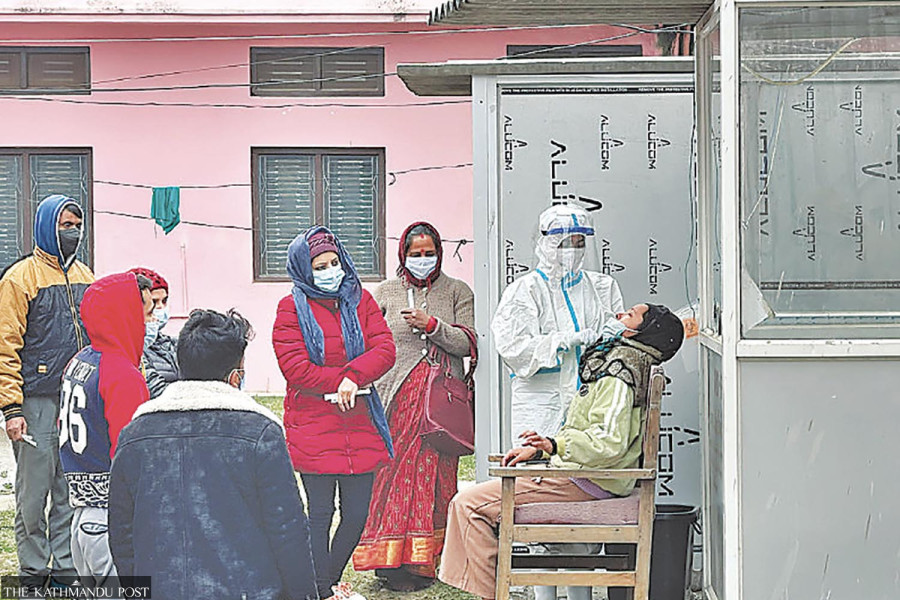Health
India reports new Covid variants NB.1.8.1 and LF.7
Nepal has only 121,000 doses of Covid vaccine and very few testing kits in stock. Officials say they won’t request donors for help unless federal government decides as they fear accountability over unused supplies.
Post Report
Amid the risk of a new surge of Covid cases in the country, the Ministry of Health and Population said that it has only around 121,000 Covid vaccine doses and a limited number of testing kits in stock.
Officials say that even though the risk of new surge of the deadly virus has heightened of late due to a surge in coronavirus cases in neighbouring India and China, they will not request the aid agencies for help, as the government has decided to hold officials accountable if foreign aid is sought and not used them on time.
“All materials including medicines stockpiled as per the disaster preparedness plan, may not come in use and many of them get expired,” said Dr Bibek Kumar lal, director at the Family Welfare Division under the Department of Health Services. “Unless the Cabinet or the line ministry decides on taking foreign aid, we are not in a position to ask for aid with development partners.”
Officials say the decision to make officials seeking foreign aid accountable was prompted by the expiry in December 2023 of four million doses of the Sinovac-CoronaVac Covid vaccine donated by China. They say that they do not want to risk consequences by asking for new aid with development partners, as the uptake of Covid vaccine in the country is currently too low.
As immunity gained from both previous infections and vaccinations has waned over time, experts warn that Nepal could also see a surge in the coming days.
“Virus could enter Nepal any time due to geographic proximity with, and the movement of people, from countries that are seeing a spike in infections,” said Dr Sher Bahadur Pun, chief of Clinical Research Unit at Sukraraj Tropical and Infectious Disease Hospital. “We’ve already witnessed Covid outbreaks here after surges in other countries.”
Experts are asking the authorities concerned to step up surveillance measures, including conducting coronavirus tests on patients with influenza-like symptoms. They have also urged the public to follow basics—wearing face masks, washing hands and avoiding crowds to cut down on infection risks.
The Epidemiology and Disease Control Division said that it has instructed them to step up surveillance measures.
“We have decided to step up surveillance measures at the Tribhuvan International Airport, as it is an entry point for travellers from countries witnessing a Covid surge—Singapore, Thailand, Hong Kong, and India,” said Dr Chandra Bhal Jha, director at the division. “Along with the international airport, we have also alerted health workers at land border points to stay vigilant.”
The division has also asked health facilities to be prepared to deal with a possible new surge.
Meanwhile, India has confirmed the emergence of new Covid variants NB.1.8.1 and LF.7.
According to media reports, Indian SARS-CoV-2 Genomics Consortium data shows that one case of the newly emerging Covid-19 variant NB.1.8.1 and four instances of LF.7 type have been detected in India. Likewise, Covid cases have been reported from Indian states of Kerala, Tamil Nadu, Maharashtra, Karnataka, and Delhi, which prompted some states to start preparations for availability of beds, oxygen, medicines and vaccines to deal with possible emergencies.
As many as 20 Indian states have reported active coronavirus cases including those which have either joined with Nepal or have thousands of Nepali migrant workers.
The World Health Organisation has clasifies NB.1.8 subvariants as variant under monitoring, with increasing proportions globally and is also starting decline. The Un health body said that additional public helath risk posed by NB.1.8.1 is evaluated as low at the global level as per the available evidence.
“Despite a concurrent increase in cases and hospitalisations in some countries where NB.1.8.1 is widespread, current data do not indicate that the variant leads to more severe illness than other variants in circulation,” reads the WHO statement.
The NB.1.8.1 and LF.7 variants are driving cases of infections in several countries including Hong Kong of China, Singapore, thailand and others.
The recent surge in new Covid cases in Southeast Asia is being driven by the JN.1 variant, which is a descendant of the Omicron BA.2.86. The World Health Organisation said that the JN.1 variant has around 30 mutations, including LF.7 and NB.1.8, the most common sub-variant responsible for the current surge.
Nepal previously reported outbreaks of Omicron BA.2.86 and its several sub-lineages, including JN.1. The symptoms of the JN.1 are similar to other variants, including fever, dry cough, loss of taste or smell, headache, runny nose, exhaustion and sore throat. Studies show JN.1 variant may cause more severe diarrhoea than other variants.
Health officials in Nepal say that only one case of coronavirus infection has been reported since January, this year.
In 2024, Nepal recorded 421 coronavirus infections.




 13.12°C Kathmandu
13.12°C Kathmandu














